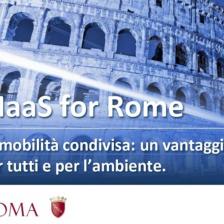
The trial of MaaS, the integrated digital platform that informs citizens and administration about public and shared mobility to promote environmental sustainability by reducing the use of private vehicles, started a few days ago.
This phase requires the participation of 10,000 selected users who, to apply, can fill in the questionnaire published on romamobilita.it.
The candidates will be chosen with the collaboration of the Roma Tre University so that citizens, students, and tourists will be equally represented, according to the guidelines dictated by the MIT.
Eight MaaS operators (Aci Infomobility, Envision, Urbi, MooneyGo, Tabnet, UnipolMove, Movesion, Wetaxi) are participating in the trial.
Knowing public transport travel times, renting, booking, and paying for a shared vehicle, and having mobility solutions available that include the use of public transport, taxis, and/or shared means of transportation, such as scooters or cars: all this will be possible thanks to the Apps of the MaaS operators specifically integrated into a single system.
Soon, it will also be possible to locate charging stations, parking availability, and regional railway timetables.
The experimental phase, also advantageous to test the effectiveness of the applications given a nationwide implementation of the project, will allow users of two or more integrated means of transport - e. g. buses + scooters - to benefit from economic cashback incentives, paid on a dedicated virtual card.
In detail, like all 'as a service,' MaaS requires a monthly flat-rate subscription that allows - usually via an App - unlimited use of public and private transport systems such as trains, buses, taxis, cars, and bike sharing. The users will be able to organise and manage, in person, each passage and pay according to actual use (pay per use), indicating the preference on the means to use, the time of travel, etc. The App will then suggest the most favourable and economical combination based on the possible solutions.
The first advantage of using 'Mobility as a Service' is, in addition to the reduced use of private cars, the reduction of traffic and pollution, both atmospheric and acoustic, journey times will be shorter, journeys will be cheaper and safer because the information on the chosen mobility updates in real-time.
Transport operators will also be able to process the data received to build their strategies and optimise services according to the needs of their users, opting for solutions and prices modulated on the use, timetables, and situation of the road network.
Five million euros have been allocated for the project, over 2.42 million from Maas4Italy funds, the Pnrr call that Roma Capitale was awarded in 2022, 2 million from the European React-EU funds, and 580 thousand euros from the Ministry of the Environment.
 Condividi
Condividi












































